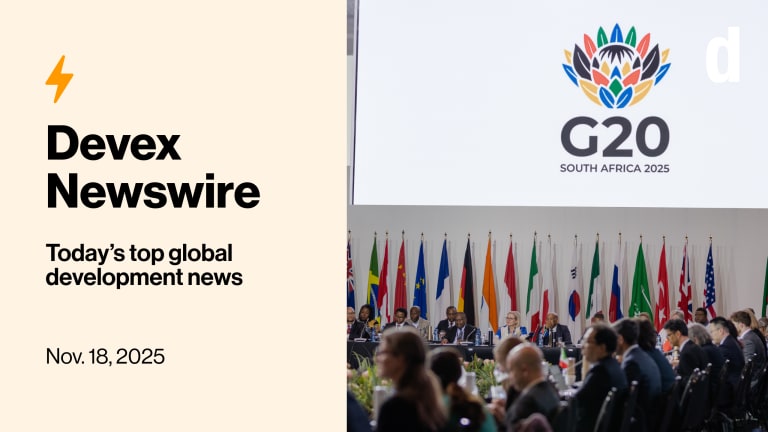
In four months, leaders will meet in New York and rubber-stamp the sustainable development goals. These could end extreme poverty by 2030 — but only if leaders also step up on finance, and commit from the outset to be clearly accountable for their delivery.
The Millennium Development Goals made great progress in sectors like health and have also helped to halve extreme poverty, but the new global goals must finish the job. That means getting to the people that are hardest to reach and focusing on girls and women to pull everyone up. That, in turn, means investment where people in the deepest poverty live. This kind of focus will take ambitious financing that is well-targeted and well-tracked to make sure the end of extreme poverty can be achieved.
New analysis in ONE’s 2015 DATA Report, released today, shows that the least-developed countries bear an increasing share of the global population in extreme poverty — yet, at the same time, the amount of official development assistance they receive is falling.
Ask most European Union development ministers about where they think aid should be spent and they’d agree that ODA in particular needs to be focused on the very poorest people in the poorest countries. Today is an opportunity for the 28 development ministers of the EU to reboot the development agenda globally — by being unambiguous about giving 0.7 percent of gross national income as ODA, urgent on the need to allocate half of ODA to LDCs, and committed to setting out road maps to achieve these targets.
The development ministers' meeting is just one step on the journey to help end extreme poverty. Clear commitments today will help open up discussions on areas like domestic resource mobilization, boosting transparency and increasing access to data so citizens can “follow the money,” all of which can ultimately help to boost sustainable and inclusive growth.
A pivotal moment on this journey will be the third Financing for Development conference in Addis Ababa, Ethiopia, where the plan on how to fund the next chapter of development is set out. It is crucial world leaders get this right and deliver a strong plan that works for the world’s poorest, but political will needs to ramp up.
ONE’s DATA Report sets out a blueprint that could be the catalyst for an agreement that puts the poorest first in the following five points:
1. Access to basic services.
Governments must agree to minimum per capita spending levels to deliver, by 2020, a basic package of services, including health and education for all, but particularly for the poorest and most marginalized, with a focus on girls and women.
ONE's DATA Report suggests a $500 per capita target, though countries must set an ambitious level appropriate for their context.
2. Domestic resource mobilization.
To fund these basic services, governments should increase domestic revenues toward ambitious, nationally defined revenue-to-gross domestic product targets and halve the gap to those targets by 2020 by implementing fair tax policies, curbing corruption and stemming illicit flows.
3. Development assistance.
This should be targeted where it is most needed, with 50 percent going to LDCs, and EU and OECD governments setting a timetable to reach the international target of spending 0.7 percent of GNI on ODA.
4. Inclusive growth.
Efforts to boost sustainable, inclusive growth have flatlined. Development partners should agree specific FfD initiatives to boost productive capacity, particularly on agricultural development, infrastructure, energy, trade and private finance.
5. Strong accountability through a data revolution.
A new global partnership should be delivered to finance the collection of data, with development partners reporting and delivering on all commitments, while opening up their own financial flows and budgets to scrutiny. Without data, we cannot have full accountability or a clear picture of progress.
Today’s EU development ministerial meeting carries a much greater significance than usual: Reaffirming 0.7 percent is more important than ever, and is setting the guiding principle that half of aid should be spent in the poorest countries on the poorest people. A growing number of poor people live in LDCs, and the depth of poverty is also greatest in these countries. The need for countries to set out the road map to deliver these promises is critical, and could go a long way toward cutting through the distrust that has threatened to slow the progress of these negotiations.
The ministers are a group of people with a real passion and purpose for their portfolio, and the EU's ambition must be the spark that ignites the ambition for Addis. The politics in New York and around the world in the FfD negotiations are in need of such a boost. With the G-7 following hot on the heels of this EU ministerial meeting, development ministers must rally around the goal of putting the world’s poorest first — they have the opportunity to lead not just Europe, but the whole world in the direction that could end extreme poverty for good.
Join the Devex community and access more in-depth analysis, breaking news and business advice — and a host of other services — on international development, humanitarian aid and global health.
Search for articles
Most Read
- 1
- 2
- 3
- 4
- 5








